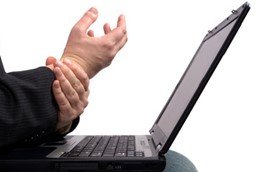Treating and preventing repetitive strain injury
Many of our patients are being treated for what is loosely termed “Repetitive Strain Injury” (RSI) – most frequently tennis elbow and achilles tendonitis – and we are often asked what lies behind RSI. Today’s post aims to provide some basic answers to these queries.
What is Repetitive Strain Injury?
Repetitive Stain Injury is an “umbrella diagnosis” that accounts for a wide range of musculoskeletal pain disorders as a result of overuse of the body. This is most often experienced in the arm (elbow or wrist) due to occupational strain.
The pain is usually a sharp stabbing pain which may initially come on performing a simple task (opening a door, carrying a jug) once the aggravating cause has ceased; however this may then go on to flair-up more often. There are many conditions that fall under this term such as tennis elbow, carpal tunnel, thoracic outlet syndrome, Achilles tendonitis and many more.
What is the cause?
When a movement or action is repeated over and over, the tissues of the body become overused and begin to break down or micro-tear. This leads to a build-up of inflammation as the body tries to repair the damage. Typical triggers are sporting injuries where an action is constantly repeated, for example running, swimming, hitting a tennis or golf ball can all trigger these conditions. Also, hobbies such as playing the guitar, fly-fishing, you name it! However, the most common cause of RSI in the modern age is overuse due to occupational strain and the biggest culprit of all is the computer keyboard – especially on laptop computers - and mouses, especially the mainstream “flat-handed” variety.
Treating Repetitive Strain Injury
An important element of the healing process is rest to allow the body to heal the tissue; however the dilemma faced by most patients is how to recover from an injury such as an elbow or wrist RSI when the causative factor is the one which puts food on the table!
Treatment methods may involve cryotherapy (using ice/cold water to help heal sprains) to reduce the inflammation and manual therapy such as osteopathy, physiotherapy and acupuncture.
Contact our therapist via email or phone or book an appointment directly!
Others methods may involve applying a brace to alleviate the pressure on the muscle insertion point – for example.
However, taking the example of a “tennis elbow” (pain of the upper/outside elbow), long-term resolution usually lies in strengthening the area functionally using in this instance stress balls and power balls.
How can I prevent Repetitive Strain Injury?
For many office-bound people, inevitably the bulk of the day is spent at a computer but this needn’t condemn you sooner or later to a Repetitive Strain Injury. Consider the following preventive measures:
• Invest in ergonomic improvements to your workstation, both at work and at home – for instance a standing desk causing you to modify your work position (sitting, standing) on a regular basis, a free-standing keyboard and a “vertical mouse” – see example here;
• Take regular breaks throughout the day, even if some are just 2 minute breaks, to stretch the arms, shoulders and back;
• Maintain good hydration at all times: you should be aiming for 1.5 to 2 litres of water each day – NB sorry, tea and coffee are diuretics increasing excretion of water from the body, causing dehydration…;
• Ensure regular whole-body exercise, which is essential for muscle health, 30 minutes of brisk walking a day is a great boost for circulation and will improve overall health in many ways;
• Seek regular good manual therapy, as it is a great way to keep muscles and joint moving correctly; a regular Osteopathic maintenance treatment every two-three months will help.
Find out more
Are you suffering from repetitive strain injury? Are you based in West London and would you want to find our more? Please feel free to book an appointment with our West London based Bridge To Health Osteopath Mathieu Rossano at 020 3757 6544 or by email mathieu@bridgetohealth.co.uk. Or simply book an appointment directly. He will be happy to see you at our Ealing or Uxbridge clinics.


